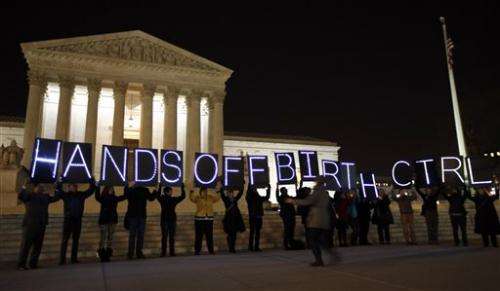Birth control rule seems to divide Supreme Court (Update)

The U.S. Supreme Court struggled Tuesday with the question of whether companies have religious rights, a case challenging President Barack Obama's health overhaul and its guarantee of birth control in employees' preventive care plans.
Peppering attorneys with questions in a 90-minute argument, the justices weighed the rights of for-profit companies against the rights of female employees. The discussion ranged to abortion, too, and even whether a female worker could be forced to wear an all-covering burka.
The outcome could turn on the views of Justice Anthony Kennedy, often the decisive vote, as his eight colleagues appeared otherwise to divide along liberal and conservative lines.
As the court heard the challenge brought by the Hobby Lobby chain of stores and others, demonstrators on both sides of the issue chanted outside in an early spring snow.
The justices upheld the overall health care law two years ago in a 5-4 ruling in which Chief Justice John Roberts cast the deciding vote in favor of Obama's signature domestic legislation. The latest case focuses on a sliver of the law dealing with preventive services, including contraception, that must be offered in a company's plan at no extra charge.
The family-owned companies that are challenging the provision provide health insurance to their employees but object to covering certain methods of birth control that they say can work after conception, in violation of their religious beliefs.
The justices have never declared that for-profit corporations, as opposed to individuals, can hold religious beliefs. The companies in this case, and their backers, argue that a 1993 federal law on religious freedom extends to businesses.
Among the groups opposing the administration is the U.S. Conference of Catholic Bishops. As it happens, Obama is to meet this week with Pope Francis.
The Obama administration says it's not just about birth control, that a Supreme Court ruling in favor of the businesses also could undermine laws governing immunizations, Social Security taxes and minimum wages.
Kennedy voiced concerns about the rights of both female employees and the business owners. He wondered what would happen if an employer ordered a woman who works for him to wear a burka, a full-length robe and head covering commonly worn by conservative Islamic women.
He asked: Does the employer's religious belief "just trump?"
Later in the 90-minute argument, however, he seemed troubled about how the logic of the government's argument would apply to abortions. "A profit corporation could be forced in principle to pay for abortions," Kennedy said. "Your reasoning would permit it."
The three women on the court, Justices Ruth Bader Ginsburg, Elena Kagan and Sonia Sotomayor, repeatedly questioned Paul Clement, representing the businesses, whether blood transfusions, vaccinations and laws against sex discrimination would be subject to the same religious objections if the court ruled for his clients.
"Everything would be piecemeal and nothing would be uniform," Kagan said.
Clement acknowledged that courts would have to decide on a case-by-case basis, but he said only the kind of family-owned companies he represented would make such claims, not large, multinational corporations. "That's something that's not going to happen in the real world," Clement said.
Roberts at one point suggested that the court could limit its ruling to just such companies.
One key issue before the justices is whether profit-making corporations may assert religious beliefs under the 1993 religious freedom law or the First Amendment provision guaranteeing Americans the right to believe and worship as they choose.
The court could skirt that issue by finding that the individuals who own the businesses have the right to object. But the justices still would have to decide whether the birth control requirement impinges on religious freedom, and if so, whether the government makes a persuasive case that the policy is important and has been put in place in the least objectionable way possible.
A decision is expected by late June.
© 2014 The Associated Press. All rights reserved.
















